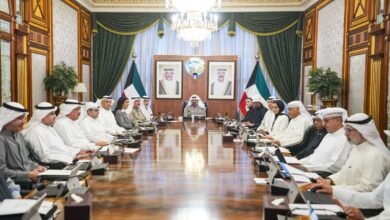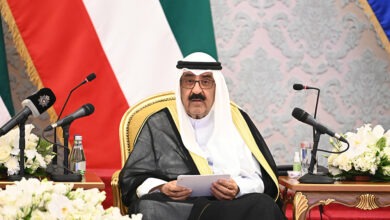Highest priority on the welfare and well being of Indian community

Message of India Ambassador Dr. Adarsh Swaika
On the joyous occasion of the 76th Republic Day of India, I extend my warm greetings to all Indian nationals and persons of Indian origin in the friendly State of Kuwait.
I take this opportunity to express my profound gratitude to His Highness the Amir of the State of Kuwait Sheikh Meshal Al-Ahmad Al-Jaber Al-Sabah, His Highness the Crown Prince Sheikh Sabah Khaled Al-Hamad Al-Sabah, and His Highness the Prime Minister Sheikh Ahmad Abdullah Al-Ahmad Al-Sabah for their patronage and support for a strong India-Kuwait partnership.
Today, as we celebrate the 75th anniversary of our Republic Day, we feel proud of India’s many achievements. Equitable development has been the corner-stone of socio-economic policies of India. Democracy, pluralism and unity in diversity are the traditional ethos of Indian society. India believes in its ancient philosophy of ‘Vasudhaiva Kutumbakam’ (the world is one family). This belief guides our foreign policy as well.
India today is a land of billion opportunities. Our collective resolve has ensured that the Indian economy is today the fifth largest economy in the world. And it is going to be the third largest global economy in the next couple of years. India is moving ahead with the spirit of ‘Make in India, Make for the World’. The massive business friendly reforms and policies have contributed in unleashing the true potential of the country.
The new India has made tremendous strides in science and technology; is one of the leading centers of innovation and Information Technology globally; is the ‘Pharmacy of the World’; has world-class production and manufacturing capabilities; and is a leading global partner to address new age challenges facing humanity. Today, we are on the right track to build an ‘Atmanirbhar Bharat’ (Self-Reliant India) with the goal of becoming a developed country by 2047.
In the international arena, India has been playing a significant role in contributing to world peace, stability and prosperity. India has championed many global initiatives with like-minded countries in recent years, including the International Solar Alliance, Coalition for Disaster Resilient Infrastructure, Global Biofuels Alliance etc to foster pro-planet action.
India has a multi-vector foreign policy that is designed to continuously strengthen its independence, freedom of choice and pursuit of national interest. India believes that dialogue and diplomacy is the only way to resolve disputes and conflicts.
In the region, India’s relations with GCC countries have been growing rapidly with major economic, energy, diaspora, security and political stakes. We are confident that India-GCC relations will be further strengthened under Kuwait’s GCC Presidency.
The historic and successful visit of Hon’ble Prime Minister of India Shri Narendra Modi to Kuwait in December 2024 has opened a new chapter in our bilateral relations with Kuwait. The conferment of the highest national award of Kuwait ‘The Order of Mubarak Al-Kabeer’ on Hon’ble Prime Minister of India is a matter of pride for every Indian. The leadership of both countries attach utmost importance to relations with each other’s country. This was evident from the exceptional gestures and hospitality accorded by the leadership of Kuwait to Hon’ble Prime Minister during his recent visit.
Our bilateral relations have been elevated to that of a ‘Strategic Partnership’. This is expected to be reflected in various domains of cooperation. We look forward to greater engagement with Kuwait, both at Government and people-to-people level, in the coming times. The large Indian community in Kuwait remains a living and vital bridge of our bilateral relations.
The Embassy places highest priority on the welfare and well-being of the Indian Community in Kuwait. I thank all the community associations, professional bodies, cultural groups and members of the Indian community for joining hands with the Embassy, where required, for the welfare of the community in Kuwait and for contributing to the strengthening of our relations with Kuwait.
Once again, on this special and proud occasion of the 76th Republic Day of India, I convey my best wishes to every Indian in Kuwait and all friends of India in Kuwait for their continued success, happiness and good-health.
Rising employment and increasing private consumption, supported by rising consumer sentiment, is expected to support GDP growth in the coming periods. Strong domestic demand for consumption and investment, along with Government’s continued emphasis on capital expenditure are seen as among the key drivers of the GDP.
Future capital spending of the government in the economy is expected to be supported by factors such as tax buoyancy, the streamlined tax system with low rates, a thorough assessment and rationalisation of the tariff structure, and the digitization of tax filing. In the medium run, increased capital spending on infrastructure and asset-building projects is set to increase growth multipliers. The contact-based services sector has demonstrated promise to boost growth, with the sector’s success being captured by a number of High-Frequency Indicators) that are performing well, indicating the beginnings of a comeback.
There are 113 unicorn startups in India, with a combined valuation of over $350 billion. Several new startups are poised to list on stock exchanges in this fiscal year, with the fintech sector likely to generate the largest number of future unicorns in the country; currently India has the third-largest unicorn base in the world. Moreover, with India ranked 3rd in the renewable energy country attractive index, the government is focusing on renewable sources by achieving 40 percent of its energy from non-fossil sources by 2030, and achieving the country’s ambitious target of net zero emissions by 2070.
However, India’s growth story is not without its challenges. According to the McKinsey Global Institute, India needs to boost its rate of employment growth and create 90 million non-farm jobs between 2023 to 2030 in order to increase productivity and economic growth.
The net employment rate needs to grow by 1.5 percent per annum from 2023 to 2030 to achieve 8 to 8.5 percent GDP growth between the same time periods. Meanwhile, India’s current account deficit (CAD) narrowed to 0.7 percent of GDP in FY24. The CAD stood at $9.7 billion for the Q1 2024-25 from $8.9 billion in Q1 2023-24 or 1.1 percent of GDP. This was largely due to a decrease in merchandise trade deficit.
The World Bank has also suggested that India should continue to prioritise lowering inequality while also putting growth-oriented policies into place to boost the economy. In view of this, several new initiatives were launched in the recent past that have resulted in positive developments, such as:
As of October 11, 2024, India’s foreign exchange reserves stood at $690.43 billion.
In 1H 2024, India saw a total of $31.5 billion in Private Equity-Venture Capital (PE-VC) investments.
India secured 39th position out of 133 economies in the 2024 Global Innovation Index, rising from the 81st position in 2015.
India ranks in 3rd position in the global number of scientific publications.
In September 2024, the gross Goods and Services Tax (GST) marked its highest monthly revenue collection at $20.83 billion.
In August 2024, the overall Index of Industrial Production (IIP) stood at 145.6, with the indices of Industrial Production for the mining, manufacturing and electricity sectors standing at 125.1, 147.1 and 219.3, respectively.
India’s Consumer Price Index (CPI) based retail inflation reached 5.49 percent (Provisional) for September 2024.
Foreign Institutional Investors (FII) inflows between April-July (2023-24) were close to $9.67 billion, while Domestic Institutional Investors (DII) sold around $540 million in the same period.
Foreign Portfolio Investors (FPIs) invested $13.89 billion during the first-half of 2024.
Over the years, the Indian government has introduced many initiatives as well as developed various effective policies and programs that have led to strengthening growth of the national economy, and improving financial stability benefiting citizens.
Additionally, a number of the government’s flagship programs, including Make in India, Start-up India, Digital India, the Smart City Mission, and the Atal Mission for Rejuvenation and Urban Transformation, have created immense opportunities in India, leading to India’s rapid economic growth over the past decade and supporting the country’s development going into the future.













